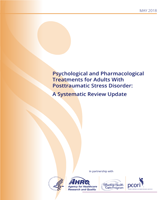From: Evidence Summary

NCBI Bookshelf. A service of the National Library of Medicine, National Institutes of Health.
| Treatment | Symptom | N Trials (Subjects) | Findings | SOE |
|---|---|---|---|---|
| Cognitive processing therapy (CPT) | PTSD Symptomsa | 5 (399)1 | Reduced PTSD symptoms SMD −1.35 (95% CI, −1.77 to −0.94) | Moderate |
| Loss of PTSD Diagnosis | 4 (299)1–4 | Greater loss of PTSD diagnosis RD 0.44 (95% CI, 0.26 to 0.62) | Moderate | |
| Depression Symptomsb | 5 (399)1–6 | Reduced depression symptoms SMD −1.09 (95% CI, −1.52 to −0.65) | Moderate | |
| Cognitive therapy (CT) | PTSD Symptomsa | 4 (283)5, 7–9 | Reduced PTSD symptoms SMD of individual studies ranged from −2.0 to −0.3 All studies favored treatment (All studies p<0.05) | Moderate |
| Loss of PTSD Diagnosis | 4 (283)5, 7–9 | Greater loss of PTSD diagnosis RD 0.55 (95% CI, 0.28 to 0.82) All studies favored treatment (3 of 4 studies p<0.05) | Moderate | |
| Depression Symptomsb | 4 (283)5, 7–9 | Reduced depression symptoms Between-group mean differences of individual trials ranged from −11.1 to −8.3 All studies favored treatment (4 of 4 studies p<0.05) | Moderate | |
| Cognitive behavioral therapy-exposure (CBT-exposure) | PTSD Symptomsa | 13 (885)3,
10–21 8 (689)3, 10, 11, 13, 16, 18, 20, 21 | Reduced PTSD symptoms SMD −1.23 (95% CI, −1.50 to −0.97) SMD CAPS −1.12 (95% CI, −1.42 to −0.82) | High |
| Loss of PTSD Diagnosis | 6 (409)3, 13, 14, 16, 17, 21 | Greater loss of PTSD diagnosis RD 0.56 (95% CI, 0.35 to 0.78) | Highc | |
| Depression Symptomsb | 10 (715)3, 11–15, 18–21 | Reduced depression symptoms SMD −0.76 (95% CI, −0.91 to ‑0.60) | High | |
| Cognitive behavioral therapy-mixed (CBT-mixed) | PTSD Symptomsa | 21 (1,349)12,
14,
22–40 11 (709)22, 23, 27–29, 34–39 | Reduced PTSD symptoms SMD −1.01 (95% CI, −1.28 to −0.74) SMD −1.24 (95% CI, −1.67 to −0.81) | Highc |
| Loss of PTSD Diagnosis | 9 (474)22–24, 31–34, 39, 41 | Greater loss of PTSD diagnosis RD 0.29 (95% CI, 0.17 to 0.40) | Highc | |
| Depression Symptomsb | 15 (929)12, 14, 22–24, 28, 29, 33, 35–40, 42 | Reduced depression symptoms SMD −0.87 (95% CI, −1.14 to −0.61) | Highc | |
| Eye movement desensitization and reprocessing (EMDR) | PTSD Symptomsa | 8 (449)13, 16, 43–48 | Reduced PTSD symptoms SMD −1.08 (95% CI, −1.82 to −0.35) | Moderated |
| Loss of PTSD Diagnosis | 7 (427)13, 16, 43–45, 47, 48 | Greater loss of PTSD diagnosis RD 0.43 (95% CI, 0.25 to 0.61) | Moderate | |
| Depression Symptomsb | 7 (347)13, 43–48 | Reduced depression symptoms SMD −0.91 (95% CI, −1.58 to ‑0.24) | Moderate | |
| Brief eclectic psychotherapy (BEP) | Loss of PTSD Diagnosis | 3 (96)49–51 | Greater loss of PTSD diagnosis RD of individual studies ranged 0.13 to 0.58 All studies favored treatment (p<0.05) | Low |
| Depression Symptomsb | 3 (96)49–51 | Reduced depression symptoms Different depression scales used; all 3 studies favored treatment (3 of 3 studies p<0.05) | Low | |
| Imagery rehearsal therapy (IRT) | PTSD Symptomsa | 1 (168)52 | Reduced PTSD symptoms Between-group mean difference −21.0; p<0.05 | Low |
| Narrative exposure therapy (NET) | PTSD Symptomsa | 3 (232)53–55 | Reduced PTSD symptoms SMD ranged from −1.95 to −0.79 across 3 individual studies (3 of 3 studies p<0.05) | Moderate |
| Loss of PTSD Diagnosis | 2 (198)53, 54 | Greater loss of PTSD diagnosis RD of 0.06 and 0.43 in individual studies Both studies favored treatment (1 of 2 studies p<0.05) | Low | |
| Seeking Safety (SS) | PTSD Symptomsa | 3 (232)56–58 | Reduced PTSD symptoms SMD of individual trials ranged from −0.22 to 0.04 Two of three trials favored treatment (0 of 3 studies p<0.05) | Low for no difference |
| Trauma affect regulation (TAR) | PTSD Symptomsa | 2 (173)59, 60 | Reduced PTSD symptoms Between-group mean difference of −17.4 and −2.7 in individual studies Both favored treatment (1 of 2 studies p<0.05) | Low |
NOTE: Outcomes graded as insufficient are not included in this table.
SMD from the Clinician-Administered PTSD Scale and other various PTSD symptom scales.
SMD from the Beck Depression Inventory and other various depression symptom scales.
Strength of evidence increased from moderate to high because of additional evidence of efficacy published since prior PTSD review
Strength of evidence increased from low to moderate because of additional evidence of efficacy published since prior PTSD review
CI = confidence interval; N = number of subjects; PTSD = posttraumatic stress disorder; RD = risk difference; SMD = standardized mean difference; SOE = strength of evidence.
From: Evidence Summary

NCBI Bookshelf. A service of the National Library of Medicine, National Institutes of Health.